If you’ve spent more time than you’d like down on your knees putting away Legos, Barbies, small cars and crayons, you’ve probably wished for a fairy godmother who could clean up your children’s play area at the end of the day. Unfortunately, no such person exists, but with a little effort, you can organize your kids’ playthings so that cleaning up becomes child’s play. Here are some tips for organizing kids’ toys.
Less is more with toys
Thanks to doting grandparents, fast food play sets and birthday parties, children can amass tremendous amounts of items. Too many playthings, however, can be overwhelming, making it hard for kids to focus. And the more toys your child has, the harder it will be to organize them. Experts advise acquiring fewer toys and setting up a rotation system to solve these problems. First, carefully choose a selection of popular playthings, then store others out of sight. Then, swap out the current toys for others after a designated time period. Meanwhile, cull constantly. Get rid of broken pieces and donate those your child loses interest in.
Think like a schoolteacher
Whether your children’s play area is a corner of the family room or an expansive playroom, set up zones for different activities just as you see in an elementary school classroom. This requires grouping like with like: all Barbies here, all art supplies there. Designate a place for every type of toy. Organizing kids’ toys in this way help children learn what goes where and builds their organizational skills.
Choose the right toy storage
Kids can’t reach their toys if they are tucked away on a high shelf in closed boxes. Instead, try this approach:
- Look carefully at your child’s toy collection, and don’t buy storage units or containers until you know what toys need to be stored and where. Then, make the storage fit the toys, not vice versa.
- Choose low shelving or cubby units that your child can easily reach. Make sure shelving units are securely attached to the wall to avoid accidents.
- Place toys in lidless baskets or clear plastic bins so kids can see them.
- Make sure storage containers are large enough to hold everything that belongs in them. Keep in mind that your child will continue acquiring new toys that need space.
- Label storage in an age-appropriate way. For toddlers, pictures of dolls or cars work best. For older children, you can use labels with words.
Keep at it
Rome wasn’t built in a day, and your kids won’t become whizzes at cleaning up their toys overnight. But help your children tidy up every day, and over time they’ll learn your organizational scheme and be able to straighten up for themselves.
Related – Finding a Space for Baby


